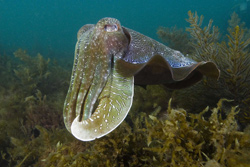Disneynature’s debut film, Earth, was a 90-minute sifting of “Planet Earth,” the BBC’s massive documentary miniseries about life on Earth. Fans of “Planet Earth” and its marine companion series “Blue Planet” might wonder whether Disneynature’s new film Oceans was likewise distilled from the latter series. Throw in the fact that “Blue Planet” was made into a film called Deep Blue, narrated for U.S. audiences by Pierce Brosnan, and one could assume that Oceans, also featuring Brosnan’s narration, is merely Deep Blue recut.
It’s not. In fact, Oceans comes from the other side of the Channel. It’s actually a sequel to Jacques Perrin and Jacques Cluzaud’s 2001 hit Winged Migration, which insinuated audiences with startling intimacy into the midst of waterbirds in flight. Wider in scope and subject matter, Perrin and Cluzaud’s new film is no less breathtakingly up-close and personal with its subjects. An early shot of a marine iguana undulating toward the surface hugs the lizard so closely that I scribbled “iguana-cam!” in my notes. How did they do it?
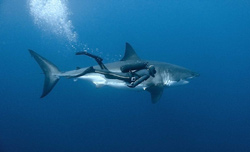
Nature doc lovers will meet plenty of old friends in Oceans: a mother humpback whale lifting her calf to the surface for a breath of air; newly emerged turtle hatchlings herky-jerking over the expanse of sand toward the sea while swooping frigatebirds pick them off at their leisure; orcas surging alarmingly out of the surf to snatch fur seals from the shallows. (Such scenes of predation are pretty tame; at one point the proximity of orcas and humpbacks made me fear a repeat of the harrowing scenario from Blue Planet of orcas harassing a mother humpback to exhaustion before leaving her calf’s half-eaten carcass to sink to the ocean floor—but rest assured that doesn’t happen here.) And of course dolphins leap, penguins torpedo and sea lions cavort to the delight of all and sundry.
But nature docs thrive on firsts, and Oceans has some eye-poppers. The unprecedented spectacle of a blue whale feeding on krill, its ventral pouch inflated with water, is breathtaking (you never see blue whales in these things; humpbacks get all the glory). The colorful silken splendor of the blanket octopus and the ribbon eel were a surprise to me (nicely complemented by the Spanish dancer sea slug). And my new favorite freaky thing, supplanting the anatomical absurdity of the leafy seadragon, is the wack-eyed mantis shrimp, a testy little fellow who gets violently territorial with crabs loitering around his front door—as one learns to its grief. Get off my lawn, punk.
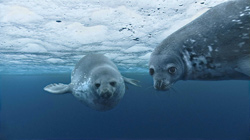
Some of my favorite nature docs—Luc Besson’s Atlantis, Claude Nuridsany and Marie Pérennou’s Microcosmos (produced by Perrin)—get by with essentially no narration at all, simply grooving on the beauty of the natural world (why are they always made by the French?). Winged Migration was in that tradition, though lightly annotated with an awkward combination of occasional voiceovers and subtitles. Oceans is more traditional, with sustained running commentary—though it’s less intrusive than in Earth, which tried too hard to appeal to family audiences with humorous informality. Oceans avoids this pitfall, partly because Brosnan’s reserved manner won’t permit lines like “Get down, baby” (though he does crack a joke about cleaner fish and how it’s “never a good idea to swallow your dental hygienist”).
If anything, Oceans tips in the other direction, with occasionally clunky attempts at narrative impressiveness. Things get off to a rocky start with ponderous What Is the Ocean musings about how the mysteries of the sea are deeper than book learning and must be experienced first-hand. “A miraculous mixture of matter and energy,” we are told, that “continues to feed us body and soul, the source of our greatest stories and legends”; a place where life began “with a splash of sunlight and color.” In the end, “instead of asking what exactly the ocean is, we should be asking who exactly we are.”
In the original French version, which runs over 100 minutes, the director Perrin reportedly wanders through the film with his curious grandson, explaining to him the beauty and fragility of the natural world, and the current and future consequences of mankind’s ongoing pollution of the oceans and destructive commercial fishing practices.
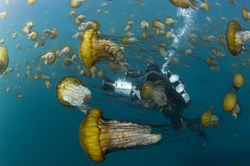
The American edition, more than a quarter of an hour shorter, leaves most of Perrin and his grandson on the cutting-room floor (the film is bookended by glimpses of Perrin’s grandson as an archetypal boy curious about the ocean). Americans won’t be subjected to queasy footage of shark hunters slicing off the fins of sharks for shark-fin soup and then releasing them back into the ocean to die (echoing his claims about staging certain disturbing images in Winged Migration, Perrin says the shark-mutilating shots were dramatized for the film, and no animals were harmed by humans onscreen). We do get glimpses of undersea nets entangling collateral victims along with their intended targets. I think the American edit also loses a shot of dolphins mating, though there is a brief, somewhat random shot of conjoined sea turtles serenely drifting.
Oceans stresses how “in one lifetime, as man reached for the stars, it seems all of nature got out of whack.” Audiences probably know to expect some discussion of global warming and its toll on the Arctic ice; Perrin also offers sober satellite footage of the flow of pollutants from rivers gushing into the planet’s ocean bodies and undersea images of animals mucking about in waters choked with detritus. (A seal drifting past a shopping cart makes a striking image, though the impact is a bit undermined by Perrin’s comments about dramatizing other shots.)
Oceans‘ environmentalist vibe goes laughably overboard in a second-half sequence in which stormy seas buffeting coasts and tossing a ship around are poetically presented as the ocean lashing out at thoughtless human mistreatment. “Anyone who knows the sea will tell of her power,” Brosnan warns right after finishing up a segment on the dangers of overfishing and bottom trolling. It’s not nice to mess with Mother Nature!
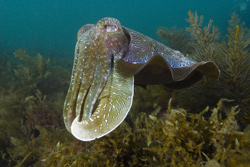
But the filmmakers know which side their bread is buttered on, and before long we’re back to cute penguins, exotic narwhals (“unicorns of the sea”), and extraordinary footage of a mother walrus holding her pup in the water, perhaps the tenderest image in the film. Oceans isn’t afraid to let the pictures tell the story for long stretches, accompanied by Bruno Coulais’s effective orchestral score. Trumpets herald breaching dolphins and whales; martial drums accompany fur seals returning from hunting and spider crabs marshaling as if for battle.
On occasion I wanted more explanations: Why does a cloud of shad ride shotgun with a whale shark that just might ingest them? (Is the benefit of traveling in the wake of a big thing worth the risk?) Since the heaps of spider crabs aren’t marshaling for battle, are they gathering to mate, or what? (Is the word “mating” off limits in a Disneynature movie?)
Ultimately, though, I prefer a documentary like this to explain less rather than more, to leave me wondering rather than try to footnote everything. In the end, we’re here to see amazing things we’ve never seen before, and would never see if it weren’t for people willing to spend seven years of their lives making movies like this.
Talk About It
Discussion starters- What was the most memorable thing you saw in Oceans? Why did that stand out to you?
- In the end, the movie says, “Instead of asking exactly what the ocean is, we should be asking exactly who we are.” What can studying the natural world tell us about ourselves? How are we like the creatures in Oceans? How are we different?
- Does the movie do a good job of discussing the environmental problems facing the ocean, endangered species, and the planet? Does it understate or overstate these problems?
- How should human beings be responsible caretakers of creation? How good or bad of a job are we doing? What specific things can individual people like us do to make a positive difference?
The Family Corner
For parents to considerOceans is rated G. It includes some fairly mild scenes of predation and a few distressing images of animals trapped in fishing nets. It should be fine for all but the most sensitive and sheltered youngsters.
Photos © Disneynature
Copyright © 2010 Christianity Today. Click for reprint information.




